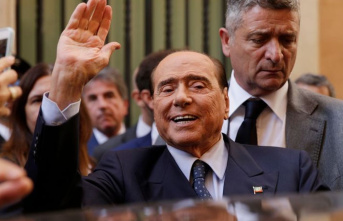A price brake is planned for gas customers because of the sharp rise in costs - politicians in the traffic light coalition are now promising relief for other energy sources as well. FDP parliamentary group leader Lukas Köhler told the German Press Agency on Wednesday: "Relief from the high gas costs should not mean that households with oil or pellet heating are worse off overall." The parliamentary director of the SPD parliamentary group, Katja Mast, told the dpa: “We know that other energy sources have also become noticeably more expensive. That is why we are also working on solutions to cushion hardship cases. The same standards must apply as with the gas price brake. "
A commission of experts set up by the government had proposed a one-off payment for gas customers in private households and businesses in December and price brakes for a basic quota of gas for these groups from March. According to the proposals, a gas price brake should take effect for major customers in industry from January.
Koehler said that the switch from gas to alternative energy sources must remain financially attractive in any case. "It would also be problematic if the reduction in gas costs meant that fuel switches from gas to oil in the industry were reversed or did not take place at all. In view of an impending gas shortage, it would be fatal if the financial relief were to lead to higher gas consumption ."
According to Köhler, who advises the commission, the gas and heat commission is working flat out on a comprehensive package of measures based on the initial proposals. "It remains to be seen whether there is still further need for action. What is clear, however, is that we cannot and should not subsidize energy prices down to pre-war levels."
Association: Millions of households with oil heating
The Fuel and Energy trade association (en2x) announced: "Heating oil users should not be disadvantaged in government aid measures compared to natural gas and district heating customers." If the plans of the commission of experts on the gas price brake were implemented in this way, according to en2x calculations, a family with oil heating would in future have costs almost 700 euros higher per year than a comparable household with natural gas heating. "As welcome as the relief for people is, it must not lead to such unequal treatment." Oil heating makes a valuable contribution to security of supply, but its users have to shoulder significantly increased fuel costs as a result of the war in Ukraine. The national average price of heating oil has almost doubled since the beginning of the year. It is about ten million households nationwide with oil heating.
The German energy wood and pellet association emphasized that compared to the previous year, the price for pellets was around 200 percent higher in the past three months. A slight relaxation is in sight. Consumers who use energy sources that are not connected to the grid, such as heating oil or wood pellets, should not be disadvantaged.
At the same time, the federal government is working on the planned electricity price brake. Eddy triggered a public presentation on Wednesday that outlined options for implementing the electricity price brake. This is to be financed by skimming off high profits from electricity companies.
According to the Federal Ministry of Economics, the EU states have now passed an EU regulation on skimming off excessive random profits on the electricity market to relieve consumers. This also envisages skimming off such profits from producers of other forms of energy.
The Federal Government and in particular the Ministry of Economics and Finance as well as the Chancellery are working flat out on the national implementation of the regulation, i.e. the electricity price brake, it said. "The ideas for the German electricity price brake provide that consumers are provided with a discounted basic quota. The normal electricity price applies to the remaining consumption." This allows the electricity price to be partially decoupled from the gas price that currently determines the price, but still offers savings incentives. "A technology-specific siphoning off of random profits" is planned. "This levy on the electricity market is complex because income and losses on the futures market also have to be taken into account."
Agreements for future electricity deliveries are concluded on the futures market. As a result, energy suppliers may be forced to deliver electricity at previously agreed, more favorable conditions, despite the current high prices. That would have to be taken into account when skimming off profits.
Daily updated prices, which are paid on the so-called spot market, have risen sharply. A retrospective skimming of profits from March of this year is apparently being considered here, as the presentation shows.
Business associations reacted with outrage. The President of the Federal Association for Renewable Energy, Simone Peter, criticized the fact that massive market interventions with retroactive effect on March 1, 2022 would be unconstitutional in the association's opinion. Kerstin Andreae, head of the Federal Association of Energy and Water Industries, said: "In principle, we see that the industry should participate financially in the consequences of the crisis and we expressly understand the short-term need for government action." In particular, the proposed retrospective regulation is highly problematic. Ingbert Liebing, general manager of the municipal utility association VKU, called a retroactive effect until March unacceptable.







